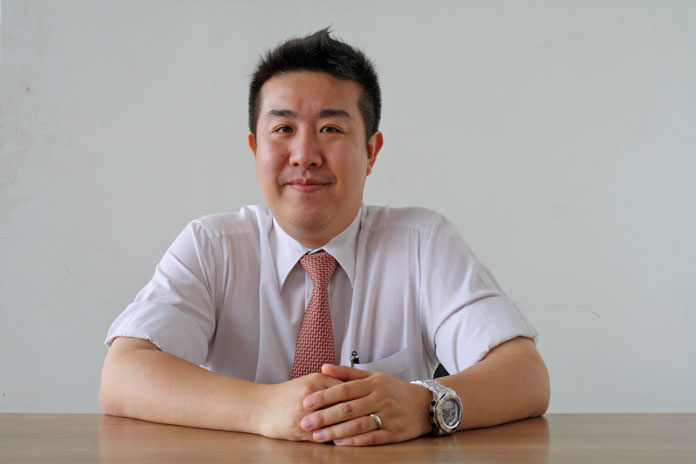Industry Insight: Dealing With Cambodia's Skills Gap

Most businesses in the Cambodian IT sector struggle to hire the employees they are looking for and generally find it difficult to recruit competent staff, concluded a new report released last month by a local business consulting and media marketing agency.
Titled Cambodian IT industry: skills for a digital economy and published by Digital Rain, the report finds there is a clear lack of skills among applicants for entry-level positions in the industry, a situation that is forcing organisations to train their own staff by making significant investments in professional development programs. With a tight pool of talent to draw from, entrepreneurs are increasingly pushing for soft skills over hard (technical) abilities during the recruitment process, prioritising attitude, enthusiasm for the job, and drive over traditional industry-specific skills like coding or the ability to manage an IT project.
IT entrepreneurs consulted by B2B identify with the situation. Pily Wong, the CEO of MDP Cambodia, a company that provides IT solutions for the banking and telecom sectors, says that most companies, including MDP, prioritise soft skills, adding that the current education system is partly to blame for the infamous skills gap. “Most of the students study to pass exams and get the diploma. They vaguely remember what they learnt at school after they graduate. It is really a pity that in the Cambodian education system, internships prior to graduation are not compulsory,” Wong says.

But companies are also finding it hard to hire local professionals for roles higher up the corporate ladder. “In terms of senior level staff, there is a widespread lack of local applicants that have the skills and experience to take on senior roles,” Digital Rain’s study reads. Wong finds the report’s finding on point. “It is very hard to recruit local staff for mid-level managerial positions,” he says, adding that “in the past, businesses had to compete with NGOs in terms of salaries, but today they have to compete with foreign investors from China, Korea, Japan, and other developed economies.”
To fill that void, companies working in IT often resort to expatriates, with the report noting that they are “still seen as necessary for highly specialised roles.” The study, however, emphasises that, as a whole, the industry helps ensure long-term sustainability by directing resources to the development of strong Cambodian staff. Difficulty to recruit the right individuals for entry, mid and senior-level positions across the IT industry, and a tendency among IT entrepreneurs to place more value on attitude and motivation than on “hard” skills: do these key findings apply to other sectors of the Cambodian economy? B2B Cambodia meets up with representatives and professionals of the hospitality, real estate and pharmaceutical sector to find out.
Competency rising in hospitality
Melbournites Brendan McCarthy and Nathan Headlam are the owners of popular night hangout spot Long After Dark, which opened its doors in the up-and-coming Tuol Tom Pong (Russian Market) neighborhood last year. Since then, they’ve recruited a considerable number of locals to work as waiters, barmen and chefs. When it comes to Cambodia’s skills gap, the bar owners say they’ve been relatively unconcerned, with the majority of their newly hired employees displaying the abilities their job required. “Except for one guy, everyone we’ve hired had the skills they needed to take on the job,” says McCarthy. Headlam admits that their kitchen assistants needed some internal training, but not so much on learning the technical aspects of their job as on developing good work habits and building professionalism.
The Australian duo says they’ve hired some of their staff through Initiatives for Livelihood Education and Development (iLEAD), a program of NGO Aide et Action that trains youth and school dropouts from marginalised sections of society in employable skills. The program launched in Phnom Penh in September 2015 and has mostly focused on skills required to join the food and beverage industry, particularly English, computer skills and soft-skills. “iLEAD was very easy to deal with,” says McCarthy. The success and ease with which McCarthy and Headlam have managed to staff their business could be indicative of rising competency levels among youngsters looking to enter the hospitality sector. Carrol Sahaidak-Beaver, the executive director of the Cambodia Hotel Association, explains that, across the industry, the level and capacity of new entrants has steadily risen as a result of initiatives by the Ministry of Education, Youth & Sport. However, most new recruits display insufficient soft and technical capabilities, says Sahaidak-Beaver. “Hygiene and the concept of how to operate in a business environment remains an issue,” she said.
Particularly alarmingly is the inability to understand relationships between employee and employer. “The range of skills that are missing starts with knowledge and responsibilities of working for a company. People walk out of the job or do not show up for various reasons,” notes Sahaidak-Beaver, adding that high school students should be mentored to better understand what employment means, what their options are and what kind of work they would like to do. When it comes to the recruitment of staff for managerial positions, she says the amount of talented and experienced people in the industry is impressive, but not enough to meet the huge demand. This shortage of talent has lead most hotels and restaurants in the Kingdom to institute career path programs to retain their most valued workers and prepare them for management roles.
Sales skills lacking in property sector
With very few training programs and schools catering to the property industry, James Whitehead, the director of content at realestate.com.kh, affirms that most job applicants hoping to enter the sector don’t have the skills needed, particularly when it comes to sales. “For real estate, the leading skills is sales. But the market generally is lacking good sales people,” he says. Whitehead says he sees a lot of newcomers being deficient in other communication abilities they need to deal with clients. Hard skills are also an issue, with many a salesperson not being as familiarised with the product they are selling as they should be. “Many don’t understand the importance of learning the technical parts of the real estate product they are selling,” he added. With newcomers in the sector insufficiently prepared to take on their new positions, Whitehead believes in-house training is crucial to bring new employees up to the level of competence the job requires.
Better STEM education makes better pharmacists
STEM education, or studies in Science, Technology, Engineering and Mathematics, has found new impetus in the Kingdom in recent years. According to Christopher Hilleary, the founder of pharmaceutical consultancy PharmASEAN, grade schools are now emphasising maths and science to a larger degree. Students are graduating from high school with a more solid STEM education, which allows the three pharmacy schools in the capital to include more advanced drug knowledge and patient assessment courses in their curriculums. In addition to possessing stronger maths and science capabilities, new employees in the industry are also much more computer literate than years past, affirms Hilleary. With the technical skills gap narrowing, the abilities that recruiters are missing the most are those required to deal with customers. Hilleary thinks new graduates have little experience working with people. “Being able to effectively communicate with patients and customers is not emphasised in their school training,” he asserts.

The industry is also suffering from insufficient specialty training in areas like diabetes and asthma, which, according to the trained pharmacist, are not emphasised to any significant degree in pharmacy schools. When it comes to filling mid-level positions, Hilleary says the problem is not a shortage of qualified applicants – there are plenty of them. The real issue for recruiters in the industry is finding people willing to make a commitment to stay with the company for several years. “Unfortunately many staff are eager to jump to competitor positions if offered a slight bump in pay.”
Entrepreneurs prioritise soft skills
Throughout the nation, an improving education system is increasingly equipping students with the practical skills they will need to join the workforce. Although the technical skills gap may be getting smaller, entrepreneurs across every sector of economic activity still find new employees generally don’t have many of the hard skills they need to do their jobs. To bring these employees up to the level of competence required, entrepreneurs are increasingly relying on in-house training programs whilst looking for candidates who display the attitude and drive necessary to make the most out of the opportunities for professional development the company offers. “For us, if you are hardworking and trustworthy and you want to learn, that’s definitely more important than knowing how to prepare cocktails,” says Long After Dark’s Headlam. Realestate.com.kh’s Whitehead is of the same mind: “When you hire young and aptly motivated local staff, often their lack of experience is a minor impediment, as long as you focus on ongoing training and creating a workplace culture where learning is a valued part of the job description. Sometimes a blank canvas allows faster growth in the role than an older hire who is set in their ways.”